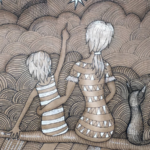A few years ago, I was travelling from my hometown to my aunt’s place in Patna by train when I saw a girl with a definite Caucasian complexion and hair colour, wearing a cotton salwar kameez, the traditional attire worn by Indians. The fusion looked interesting, so I kept observing her from my seat as she read, peered outside the window, and fidgeted, looking distinctively different from the other passengers.
Trouble started for her when the lady with the food cart arrived. She must have pre-ordered a meal but was unable to claim one without showing a copy of her ticket. She fiddled through her purse and bag, looking into every pocket, but the ticket seemed to have disappeared. Digital tickets weren’t common in India in those days. The girl insisted she had the ticket when she boarded the train and had somehow misplaced it, but the lady won’t budge. Though she spoke crisp Hindi, her thick American accent was making it very difficult for the native food-lady to understand her words, or maybe the prejudice against foreigners was stopping her from giving the girl a wide berth. I watched the two communicate from afar. As the girl threw her hands up in exasperation, I couldn’t bear to be a passive onlooker anymore.
Introducing myself, I asked if the girl needed any help. She gratefully requested me to decipher her words for the lady the next time she came. Nodding, I sat in front of her. Once she found the ticket and relaxed a bit, we began a conversation about comparisons. I was an engineering student at the time while she studied Hindi at the Banaras Hindu University. The first thing she said after learning about my education was – India has a lot of engineers. A substantial number of IT professionals she knew back home were of Indian origin. I smiled and told her that my specialisation was Electronics and instrumentation, not information and technology.
We then shared other minor details of our lives.
Both of us had strict mothers; she too had a curfew just like the one I had at home – you have to enter the premise of this house before it becomes dark, or you are welcome to spend the night on the roadside. Both of us loved to watch The Supernaturals more than The Vampire Diaries and were diehard fans of Robert Downey Junior. She loved spicy food while I didn’t, which surprised both of us given our backgrounds – an Indian is expected to appreciate piquant food while an American is not. She knew a lot more about Mahabharata (the longest Indian epic) than I did.
Talking to her was easy; she never felt like a stranger; rather, it seemed like a conversation between two old friends who had met after a couple of years. We talked about the subjects we learned in school, my love and her hatred for trigonometry, and also about the long summer vacations and how both of us hated going to camps, preferring to read books in the cosy nest of our parents’ home.
Soon Banaras came, and we bid each other farewell.
I never met the girl after that day. However, our conversation stuck with me. It came back to me time and again, and as I grew up, it started sounding odder. Why was it that both of us expected ourselves to be more dissimilar than similar?
The likeness between our upbringing, beliefs, tastes, flavours, and choices took us by surprise as if we were species from two different planets. It was difficult for us to believe that two girls raised on different continents, separated by a vast distance and who grew up amidst dissimilar cultural norms, could easily identify with one another.
We have this preconceived notion in our mind that a person from a different place is bound to be different, and neither of us stopped to think that we are humans after all. What is so shocking about being similar?
Now that I think of those few hours we spent conversing, I realise that we humans were also like the compact continental mass PANGEA that stuck together at the beginning of time. It was only after the drift that continents separated into different lands, with their ridges still bearing the mark of being linked to one another.
Similar to the elements found inside the margins of the crust of these widely separated continents, our anatomy and physiologies are the same. The emotions we feel are alike, and the way we express them are similar too – a smile or laughter in the face of happiness and flaring nostrils when one becomes angry. Love is expressed in the same manner in every part of the world and the blood flowing in every person’s veins is red. We all need partners, and each one of us runs from loneliness.
What actually differentiates us is our desire to be seen as different.
We created separate counties, states, districts, and villages and drew boundaries all around those places demarcating the separation, and highlighting it for clarity. We then asserted our rights to the place we thus inhabited. Once that was done, we named ourselves after them – Indian, American, British, and French, alienating those who did not belong to our land of birth. As if coming from a different part of the world somehow makes a person an alien altogether.
Once we successfully created nationalities and declared our ownership of them, our desire for distinction led us to create boundaries within the human race based on colour. We labelled our skins as if the count of melanin was something to be happy or sad about – blacks, whites, browns, and then we began the game of subjugating, hating, and dethroning the ones who were of a different colour.
After we were successful in creating differentiating frontiers and breeding hatred in the name of dissimilarities, we finally began the process of creating a united world, failing to remember all along that the world was originally united, and it was us who broke it into pieces and created huge barriers between them to fulfil our greed.
The hypocrisy of the human race is we assert the fact that we wish to create a world free of bias, and then we proudly proclaim our identities based on differences. Instead of actually fighting for equality, we pretend to be patrons of egalitarianism and then subjugate others who are slightly different. Every protest movement around the globe is proof of the same.
While loving one’s nation and being true to one’s community and land is both patriotic and applaudable, we need to understand that there has to be a limit to this love. Not only do we need to know where the boundaries of this self-love should end but also we need to teach our children that such differences have no meaning in life.
When the war begins, it spares no one.
We must stop trying so hard to highlight the differences between – men and women; blacks, whites, and browns; natives and immigrants; people following different religions, etc. Instead, we should learn to accept one another as humans who have no other identity except being the inhabitants of the planet we all share.
Every other day, we see proud proclamations by leaders, multinational companies, and several other organisations that the internet and global trade are bringing down the barriers between us, and the world is getting closer to becoming a global village. And then, the countries hosting those leaders and organisations demonstrate their power through nuclear tests, warning the others to stay away and stay bowed before their superiority. The proud proclamation by each one of us ends at our convenience.
It’s time we stop broadcasting and start practising the idea of equality.



